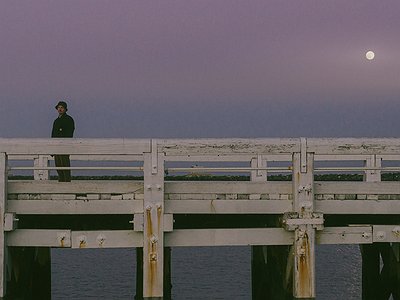Name: Florian Maier aka FloFilz
Nationality: German
Occupation: Producer
Current release: The new FloFilz album Close Distance is out via Melting Pot Music. On Close Distance, Florian Maier engages in a string of collaborations with both established and rising acts from the new London jazz scene, including Alfa Mist, Blue Lab Beats, Jerome Thomas, KeepVibesNear, Summers Sons & C.Tappin, Dal as well as Hunter Rose.
[Read our Alfa Mist interview]
[Read our Blue Lab Beats interview]
If these thoughts by FloFilz piqued your interest, visit him on Instagram, Facebook, and Soundcloud.
For a more expansive interview with FloFilz about his creative process and the collaborations he engaged with on Close Distance, see our first FloFilz interview.
Your reference points are really diverse: 50s and 60s jazz, downbeat electronica of the 90s, as well as the sounds of the new millennium. Where do you find your inspirations?
The first concrete inspiration was probably Dave Brubeck's "Take 5" which was in my dad's record box. Already as a kid, I was fascinated by the entire album that piece was on (Time Out), just like I was drawn in by Sarah Vaughn and Nat King Cole.
When did hip hop enter the picture?
Much later, actually! I was around 18 when I stumbled upon A Tribe Called Quest. But the impact was so powerful that I listened to little else for quite some time.
I started digging for similar stuff and, in doing so, discovered the German beat scene. Proceduri di Rutina by Hubert Daviz had just come out, an entire project built around Romanian jazz samples. That record completely blew me away.
There are instrumentals and vocal features on Close Distance. They blend really well, I find.
On the one hand, instrumental music has this certain kind of magic. There are no distractions, there are still a few white spots on the acoustic screen. It all lends an air of timelessness to everything. If you add vocal songs to this, it can give really great results.
Then again, I do really enjoy pure vocal projects as well. Like the Lost in Translation EP I recorded with Los Angeles rapper K.A.A.N.! What matters is that you can trust the person you're collaborating with. There should be a basis for mutual inspiration and the will to allow an element of surprise.
When it comes to instrumental hip hop, there seem to be two approaches: You can either consider the beats an artwork in their own right and simply loop them. Or you can use them as the point of departure for more complex pieces. Where do you stand on this?
It really depends on the beat in my opinion! I can listen to many beats by J Dilla on loop forever. They just never get boring. In a way, that's pretty much a perfect beat right there. If the loop is great and catches you, I don't think you need a lot more. Another example for that would be Madlib's tracks with Freddie Gibbs.
Of course, it can be exciting to take that extra step towards more intricate arrangements. But I don't feel that's always required.
What's your take on sampling?
If I sample something, the intention for me is foremost to understand the history behind the music.
Both in jazz and hip hop, that history is very important and multi-layered. I'm only a guest in this culture. So it feels particularly important to constantly deal with what informs it.
Which passages out of a song typically interest you?
Hard to say, it's more of a gut feeling. I will usually have an idea of what the passage should sound like, but I'd be hard pressed to define it.
Generally speaking, in the passages I like, there doesn't need to happen a lot. But they should tell a story and carry a certain vibe. Ideally, my own ideas will then add to that.
I suppose the artwork is part of that. With your releases, it always seems particularly closely interwoven with the music.
This goes back to when I was working on my album Metronom.
It was my first release for Melting Pot and label head Robert Winter had the idea of travelling to Paris and complementing the sounds with photography in the booklet. It actually made me go back to the music and arrange it so it would fit the experience of that Paris trip. As a result, you can really immerse yourself in another world – or a particular city in this case – without having to focus on any lyrics.
The albums Cenário and Transit were natural extensions of this idea.
It's a sort of mental travelling – in space, but also in time.
In a way, yes. Some of that is intentional, some of it takes place subconsciously. I never really had a concept. I just want to take the listener on a journey and make them experience the same images that I see when working on my music. Many people have told me that my beats sound quite melancholic and I guess they're not wrong.
My own experiences tend to be bittersweet. There's actually a word for that in Portuguese, “saudade”. That's exactly what things feel like to me – and my music reflects that.




